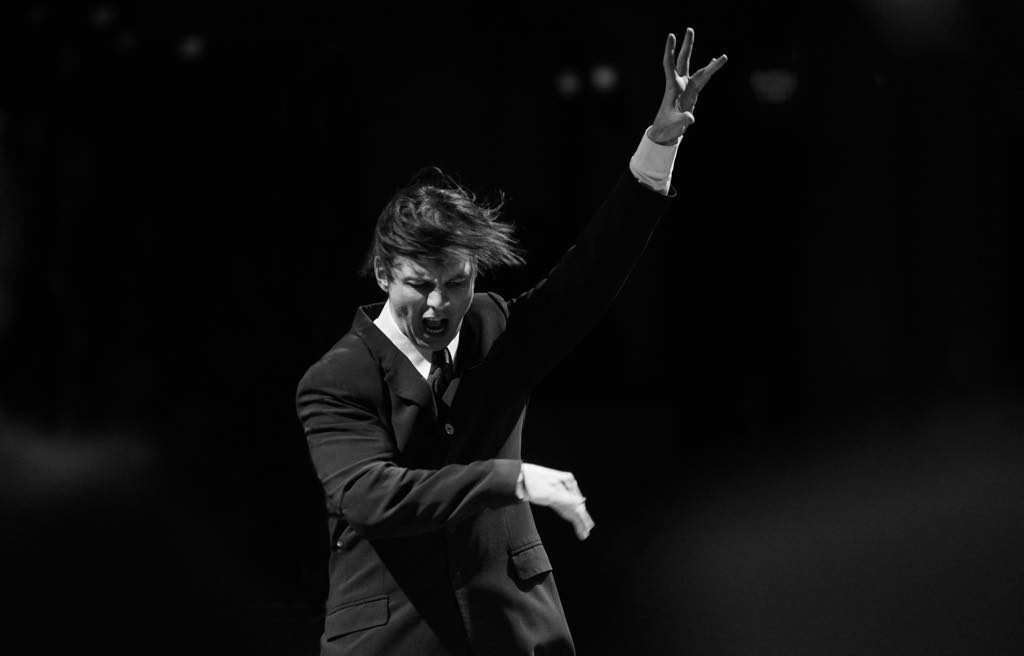
When he walked out onto the stage of Paris’s Théâtre du Châtelet Sunday afternoon, he was greeted with whoops and hollers, just like any rock star, but although he may look like one, Teodor Currentzis is no such thing. He is a conductor of classical music, for whom such a reception would normally be out of the question.
The 47-year-old Currentzis is no “normal” conductor, however, and, as is his wont, he had a number of surprises in store for the audience on Sunday. The program announced on the theater’s website was Mozart’s Requiem in D Minor, K 626, but as soon as Currentzis had joined his MusicAeterna orchestra and choir – all dressed in identical priestly black robes – the stage and house went completely dark as the choir intoned a Gregorian chant, “Introitus: Requiem Aeternam,” followed by the recently formed MusicAeterna Byzantina choir’s rendition of “Exedysan Me Ta Imatia Mou” by Konstantinos Pringos and then a haunting solo by Adrian Sîrbu.
MusicAeterna then launched into its crisp, clean and, yes, joyful version of the Requiem mass, fronted by superlative soloists Sandrine Piau (soprano), Paula Murrihy (mezzo-soprano), Sebastian Kohlhepp (tenor) and Evgeny Stavinsky (bass).
The audience was in for yet another surprise, however. After the ensemble’s lovely rendition of the Lacrimosa movement, both Mozart and Currentzis stepped aside for a brief interlude while a traditional Byzantine song was performed, injecting an antique note into the midst of the lush classical beauty of the Requiem.
Currentzis is both adored and reviled in the classical music world for his iconoclasm (in musical interpretation), eccentricities (in dress and behavior – it’s not hard to see him as the young goth he once was) and the high standards he sets for his musicians and singers, which often keeps them up late into the night rehearsing until they get it just right – something rule-bound orchestras don’t usually appreciate. At Châtelet on Sunday, the audience’s wildly enthusiastic reaction to the performance exhibited plenty of adoration and no revilement.
Currentzis likes to imagine himself in the composer’s skin and bring out his “revolutionary spirit.” He feels he is channeling Mozart’s wishes when he plays his music. “Mozart is always contemporary,” he has said. “Mozart is always modern.”
That spirit came through on Sunday. And, as I learned while watching him rehearse with MusicAeterna when Russian filmmaker Ilya Khrzhanovsky’s immersive-theater project DAU was occupying the Théâtre du Châtelet last January, Currentzis is a perfectionist who won’t stop until he gets it right. Mozart would certainly approve.
The conductor, born in Greece but now a Russian citizen, recently resigned his position as music director of the Perm Opera and Ballet Theater in Russia. The MusicAeterna orchestra and choir is now resident in Saint Petersburg. Currentzis is also the chief conductor of the SWR Symphony Orchestra Stuttgart and director of the Diaghilev Festival.
He will conduct Verdi’s Requiem at the Philharmonie de Paris on March 26, 2020, and will be back at Châtelet on May 20 with a Fauré program. During the 2020-21 season, he will be in residence at Châtelet and will conduct Diaghilev Festival concerts there, along with other as-yet-unannounced programs.
We can only thank this maverick, slightly nutty but brilliant conductor for bringing some sex appeal and passion back to classical music, usually considered the exclusive domain of the elderly, while raising its standards. Bravissimo!
Favorite